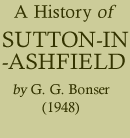< Previous | Contents | Next >
Chapter XII.
Poor Law
This great problem is dealt with under several headings. The Institution of Overseers of the Poor, temp : Queen Elizabeth, a.d. 1601, necessitated by the breaking up of the Monasteries which had always maintained Guest Houses marked a great change in local affairs, till 1662 when stringent measures were taken to confine persons to their own parish should they prove unable to maintain themselves and in 1691 Acts of Parliament were passed to control the lavish expenditure of the Overseers. This reaction took the form of building Houses of Industry by the voluntary combination of parishes, and in 1782 an Act, called Gilbert's Act was passed making it compulsary for the Overseers to provide all unemployed persons with work. Each parish at that time had to maintain its own poor, and a Workhouse was built in consequence in Hardwick Street, Sutton, and a separate account of its history will be found later. The condition of affairs at Sutton at the beginning of the nineteenth century may be seen from the following extract from the Nottingham Journal, 14 September, 1816. "At a numerous and respectable meeting of the land occupiers and inhabitants of the Township of Sutton-in-Ashfield held this day pursuant to public notice, for the purpose of taking into consideration the present distress of the Poor and the enormous amount of Public Rates. E. S. Godfrey, Esq. in the Chair. It appeared to this meeting that the township of Sutton contains 710 houses, and 4889 acres of land, and that in the year 1815, 630 houses paid Poor Rates ; but at this time they are reduced to about 220 that are able to pay, and that there are now upwards of 1700 persons receiving support from these housekeepers and land occupiers, and that the present expenditure is upwards of £100 per week. Resolved unanimously, that it will be most expedient and will contribute most efficiently to the reduction of the Poor Rate to furnish as much as possible Employment to the Manufacturing class of poor Inhabitants.
That it will be necessary to raise a sum of money by Subscription as a Loan to enable the Committee to be appointed to carry into effect the above Resolution and that appeals be made to the principal owners of land to carry it into effect. That the Churchwardens and Overseers for the time being with Messrs. Godfrey, Thos. Heygate, Saml. Ward, Wm. Butcher and John Heath be appointed a Committee for the management of the Fund . . . . That such Committee shall contract for Materials and Labour, and that all the Stock and Manufactured Goods shall be the property of such Committee for the purpose of securing the debts to be contracted by them, and the repayment of the sums raised by Subscription as far as they will extend. Resolved unanimously with the exception of Mr. Godfrey, that it appears necessary to this meeting, notwithstanding the relief which may be afforded by the adoption of the measure recommended . . . . that an Application should be made to obtain a Rate in Aid from other Parishes either within the hundred of Broxtowe or some other Hundred in the County towards the maintenance of the Poor of this Township, and that Mr. Walkden be employed by the Overseers of the Poor to take the necessary measures for that purpose. Resolved that Mr. Godfrey be requested to submit the Resolutions of this meeting to his Grace the Duke of Portland as early as possible."
This attempt by a public body to interfere with the ordinary course of trade was a complete failure. The cost of production was so high, the management so lax, and the organisation so inefficient that when the goods were offered for sale no purchaser at a profit could be found, and much ill feeling was aroused amongst the weavers of other places.
On 15 March, 1817, a perpetual Overseer was advertised for, applications being directed to Mr. James Daubeny and Mr. John Lindley, and as a result on 7 April, Mr. H. Stevenson was appointed (the first) Assistant Overseer at a salary of £52 10s. Od. It is difficult today, much as we are troubled, to imagine the condition of affairs at that time, when half the inhabitants were receiving poor relief from the 220 ratepayers able to pay, and it is not to be wondered at that all who could leave the parish did so, and the names of Sherbrooke, Morris, Newton, Owtram, Frignall, Revill, Ordidge, and others disappear from the Rate Books. The history of Luddites, Chartists and others resulting from this distress will be found elsewhere, but as late as 1847 when Mr. William Bonser, Draper of Low Street and Mr. James Lindley, Farmer of Stonehills were Overseers, no less than fifteen Rates at lOd. in the Pound were made and collected for the relief of the Poor, while the preceding Overseers were distrained by the Guardians for not having paid the Call. However, the Poor Law Amendment Act of 1834 forming unions of parishes, amended 1836, 1838, 1846 and 1847 spreading the incidence of Poor Relief over larger areas brought infinite help, and the building of a central Workhouse at Mansfield was an unqualified blessing to the overburdened ratepayers of Sutton-in-Ashfield.
